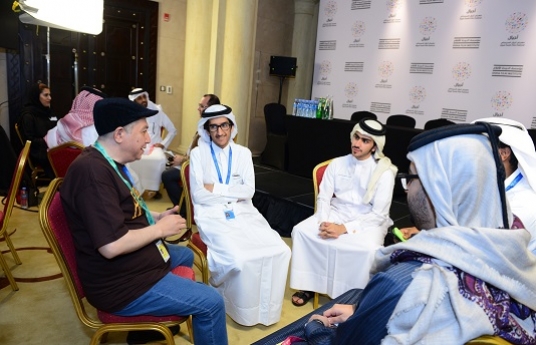Qatari talents see steady growth of home-grown film industry
Dec 04, 2014

975 kB
Doha, Qatar; December 4, 2014: Qatari talents who are showcasing their films at the second Ajyal Youth Film Festival, presented by the Doha Film Institute, say they see a steady growth in the country’s film industry with more Nationals and residents stepping forward to make films locally.
“Only a few years ago, the scenario was different,” says Ali Al Anssari, director and screen-writer of Qarar, a short film set in a post-apocalyptic world screening in the ‘Made in Qatar’ showcase of the festival. “Then, it was not only difficult to find talented professionals and support crew but also to present a film to a wider audience.”
Today, he says, more Qatari Nationals are stepping forward to pursue their ambition of making films. “For me, my passion is to make films of different genres. A lot of filmmakers focus on our culture and traditions; my vision is to bring different genres of movies from the Arab world.”
Al Anssari said the local support has played an important role in creating a Qatari film culture and a homegrown industry, a sentiment shared by Salman Al Muhannadi, Executive Producer of Amreeka La!, directed by Hind Al Ansari.
“A number of Qataris are making films, which are on YouTube but I feel that what our filmmakers must give more attention to the scripting process,” says Al Muhannadi. He said while the difficult part of making Amreeka La was to find the right location (which they eventually found by converting a furniture showroom into a living room set), he said there is a nurturing environment in Qatar today for making films.
Yousef AlMoadhadi, editor, cinematographer and director of another ‘Made in Qatar’ film 10%, observes that “Qatar today offers the support and guidance for young filmmakers. Yes, we don’t have a mature industry yet but we are making strong progress and there is a clear vision to develop the country’s film industry.” Al Moadhadi has made several films earlier but 10% is the first to be screened at the festival. His goal, as a filmmaker, is to tell the rest of the world the diverse history and unknown facets of not only Qatar but the Arab region through cinema.
Abdulaziz Al-Saadi, cinematographer and director of He Will Steal It explains the ease with which films can be made today in Qatar. “I shot the film in just over three hours; today, finding the people and location is easier than before, and people understand and appreciate our effort.”
Leena Al-Musalmani, screenwriter-director of Public Phone, agrees. “Some years ago, it might have been a novelty for a women crew to scout for and shoot films.” She likes to make films that she can relate to, and goes the extra length in polishing the script. Public Phone, initially assisted in the scripting process by the Doha Film Institute, took over five months of scripting and another seven months into production and post-production.
Mais Rabie and Rokaia Kilanai, residents of the country and co-directors of Al Ruznama, said they are now working on a film that documents the cinema and theatre history of Qatar. “Qatar’s film industry has made a leap in growth in the past few years,” they say. “With initiatives such as Ajyal, there is not only the inspiration to make movies but also a platform to reach a wider audience.”
Shamir Allibhai, also a Qatari resident and producer, writer and director of Kings and Queens of Qatar, says the support of the Doha Film Institute has indeed been a catalyst for filmmaking in the country. “For my own film, I sourced my equipment from the Institute.” He brings an unknown facet of Qatar – the country’s professional chess players with a focus on the women’s team. “To gain their trust in telling their story to the world was the key task,” says Shamir, who followed the team to the 40th World Chess Olympiad in Turkey. He sees tremendous potential for the country to build its film industry.
Ali Al Anssari summed it up: “Qatar has the location, the talents and the resources. All you have to do is just go out and make your movie!”
For more details on the Ajyal Youth Film Festival, please visit www.dohafilminstitute.com/filmfestival